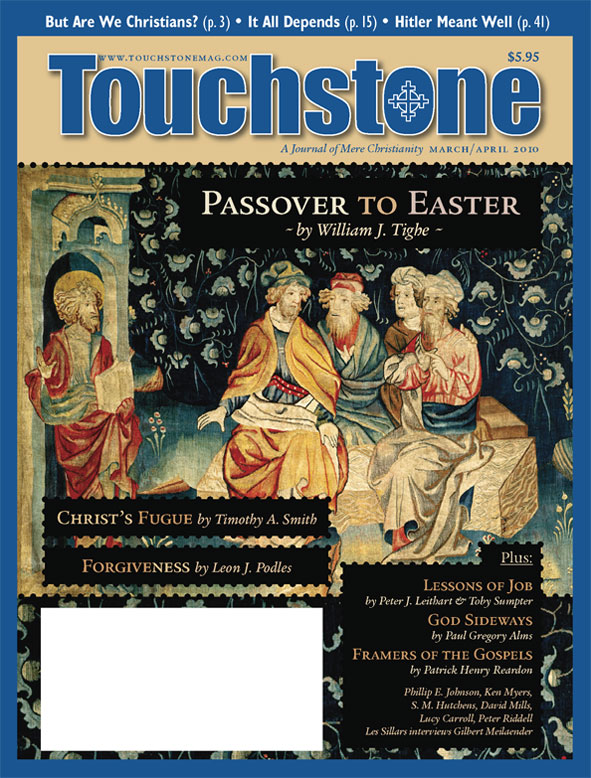Feature
There Is Forgiveness
But There Are No Shortcuts on the Road to Reconciliation
When she was a teenager, Gina Trimble became the Reverend Raymond Kownacki’s housekeeper after he told her parents that he would help her get a better education. He educated her—in what it felt like to be raped. She got pregnant, and he induced an abortion by hand. She passed out and later delivered a dead fetus.
She left him and told her parents. They visited Bishop Albert Zuroweste of Belleville, Illinois, who, according to court records, “took no notes and showed little interest in Gina or her claims.” After they left his office, the Reverend Dean J. Braun, Kownacki’s successor at the parish, who had accompanied the Trimbles, told them that “Bishop Zuroweste would not discipline Father Kownacki and that Gina must forgive Father Kownacki and forget his physical and sexual abuse of her.” To accomplish this, Braun performed a ceremony unknown to the Roman Rite: “He placed a ritualistic vestment on his shoulders, anointed Gina with oil, prayed over her in Latin, and while anointing her with oil, told her she must give up her anger and that she must forgive Father Kownacki and forget what he had done to her or her soul would die.”
This is an extreme but representative example of the misunderstanding and misuse of forgiveness. The demand that victims forgive their abusers is used to avoid the hard work of repentance and restitution. In Forgiveness and Abuse: Jewish and Christian Reflections, editors Marie M. Fortune and Joretta L. Marshall write, “The demand to forgive so that everyone will feel better, or the desire to minimize conflict in relationships, encourages ‘forgiveness’ that is too quick and, ultimately not redemptive.”
Catholic and Protestant leaders find this misunderstanding of forgiveness a useful tool. In an essay in Forgiveness and Abuse, Peter Horsfield notes that
Church leaders often use forgiveness as a tool for settling abuse situations as quickly and easily as possible to avoid scandal, conflict, and disruption to institutional programs, to spare them from having to confront or oppose a powerful and threatening person, to avoid possible legal action, and to avoid having to face up to injustice and abuse in churches’ own structures.
This desire to avoid conflict is strengthened by the predominantly female membership of the churches. Women have a stronger tendency than men to maintain relationships at any cost: They keep the family together, not only in hard times, but even in cases of incest. They are frequently victims of abuse in churches, but are also the ones who do not want the abuse confronted lest it tear the church apart.
Stages of Forgiveness
Forgiveness has many stages. First of all, like any human act, it must be in accord with reality. Actions that are based on a false perception of reality are not good actions. The injured party must react in accord with reality. He must be angry at the real evil that has been done to him. The reality of the sin and injustice must be recognized, not only in words, but also in deeds.
We speak of someone being in a false situation; the thief who verbally confesses his sin but refuses to return the money is living in a false situation. The offender must recognize the truth of his position in regard to the person he has offended. Then the offender must act on that position, by a repentance that includes acknowledging his offense to all those hurt by it, by the acceptance of deserved punishment, and by the will to make restitution.
Leon J. Podles holds a Ph.D. in English from the University of Virginia, has worked as a teacher and a federal investigator, and is president of the Crossland Foundation. He is the author of The Church Impotent (Spence), Sacrilege (Crossland Press), and Losing the Good Portion: Why Men Are Alienated from Christianity (St. Augustine Press). Dr. Podles and his wife have six children and live in Baltimore, Maryland. He is a senior editor of Touchstone.
subscription options
Order
Print/Online Subscription

Get six issues (one year) of Touchstone PLUS full online access including pdf downloads for only $39.95. That's only $3.34 per month!
Order
Online Only
Subscription

Get a one-year full-access subscription to the Touchstone online archives for only $19.95. That's only $1.66 per month!
bulk subscriptions
Order Touchstone subscriptions in bulk and save $10 per sub! Each subscription includes 6 issues of Touchstone plus full online access to touchstonemag.com—including archives, videos, and pdf downloads of recent issues for only $29.95 each! Great for churches or study groups.
Transactions will be processed on a secure server.
more from the online archives
calling all readers
Please Donate
"There are magazines worth reading but few worth saving . . . Touchstone is just such a magazine."
—Alice von Hildebrand
"Here we do not concede one square millimeter of territory to falsehood, folly, contemporary sentimentality, or fashion. We speak the truth, and let God be our judge. . . . Touchstone is the one committedly Christian conservative journal."
—Anthony Esolen, Touchstone senior editor










